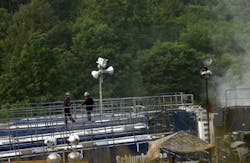A review of the first publicly available data from chemical testing of hydraulic fracturing wastewater in California has identified high levels of hazardous chemicals.
The Environmental Working Group (EWG), a non-profit, non-partisan environmental organization, examined data on wastewater from hundreds of fracking operations, revealing that much of it was heavily contaminated with chemicals known to cause cancer, reproductive harm and nervous system damage.
A state law was passed in September 2013 requiring drilling companies to test their fracking wastewater and publicly disclose the results.
California is the only state that requires comprehensive chemical testing of fracking wastewater and public disclosure of the results. Because of this, the data offers an unprecedented insight into the composition of fracking wastewater and an indication of what chemicals may contaminate such waste nationwide, the organization said.
An extensive analysis of the data by EWG revealed significant levels of petroleum chemicals, heavy metals and radioactive elements, along with high levels of dissolved solids.
Specifically, tests of wastewater samples found the known carcinogen benzene as well as chromium-6, lead and arsenic, in 35 to 50 percent of the samples. The wastewater had, on average, thousands of times more radioactive radium than the state's public health goals, as well as high levels of nitrate and chloride ions.
Yet EWG pointed to what it said were "major flaws" in the state's reporting system, with many drilling companies failing to report full details of the chemicals their testing found. Records for some wells were missing altogether, the organization added.
"As we reviewed California's fracking wastewater data, it became clear that the first year of this reporting system is not fulfilling its promise of providing full and transparent information," said Renee Sharp, EWG's director of research. "There was too little oversight by the state and not enough communication with drilling companies, which led to massive gaps with missing or incomplete information."
EWG said that reporting requirements on fracking wastewater should be streamlined and strengthened to provide complete and transparent information about the chemicals it contains, as well as details of how the waste is disposed of.
The group also called on the state to immediately halt the disposal of oil and gas drilling wastewater into wells that may endanger California's water supplies, even if that means halting oil and gas drilling in these locations.
And the report recommends testing at every location where illegal injection of wastewater has occurred, to help protect water sources.
